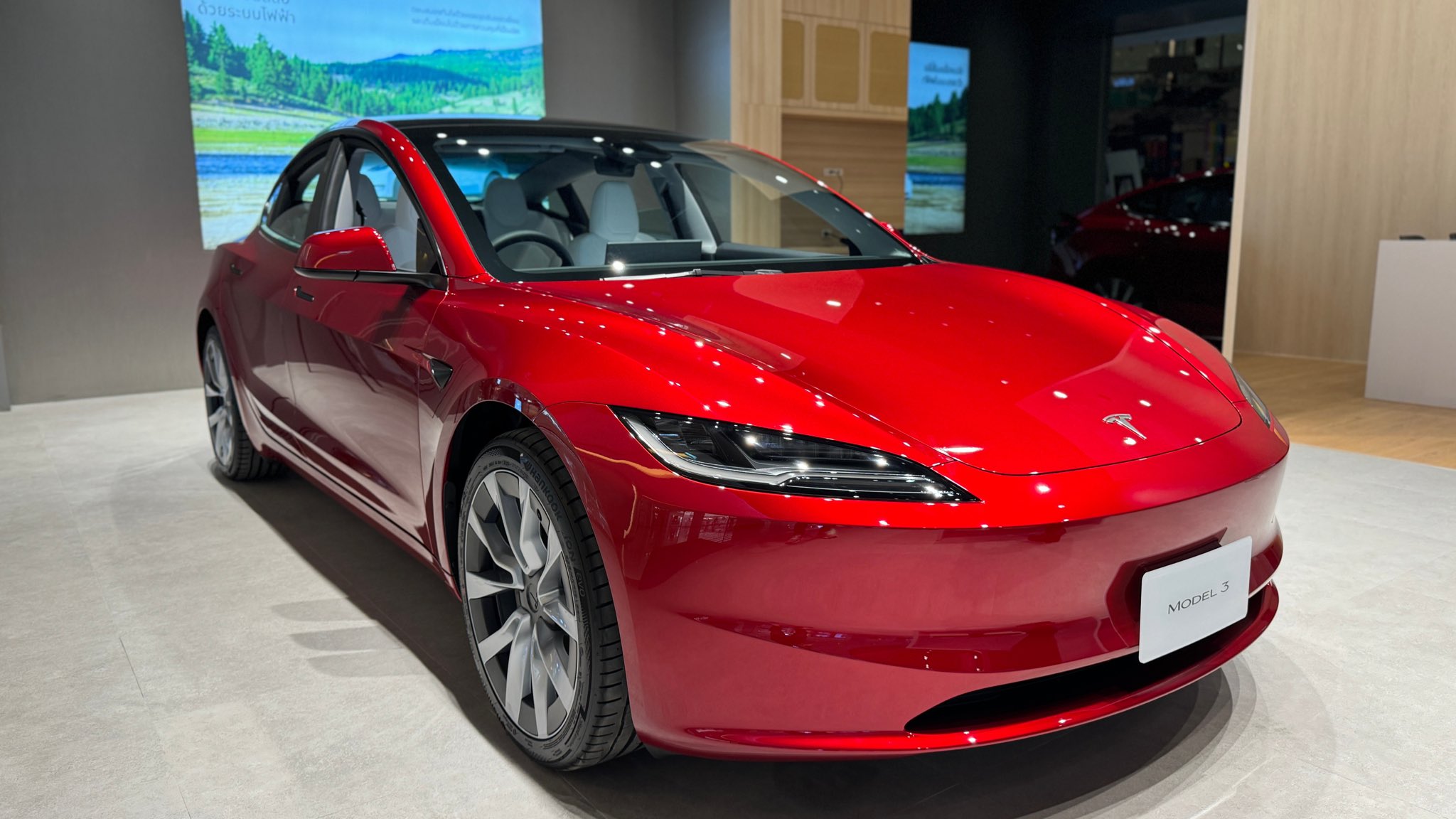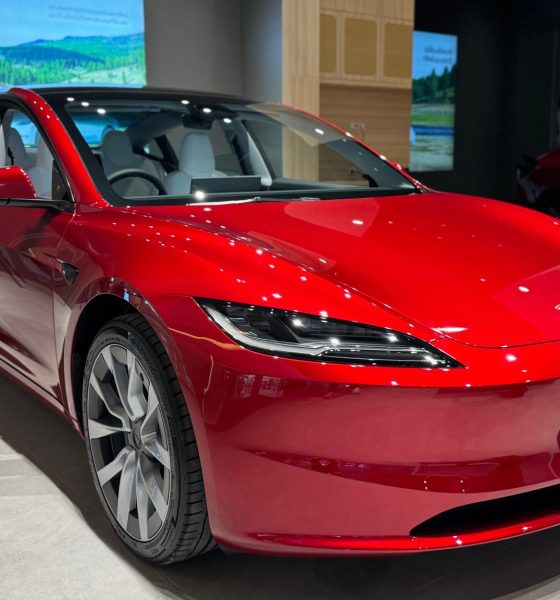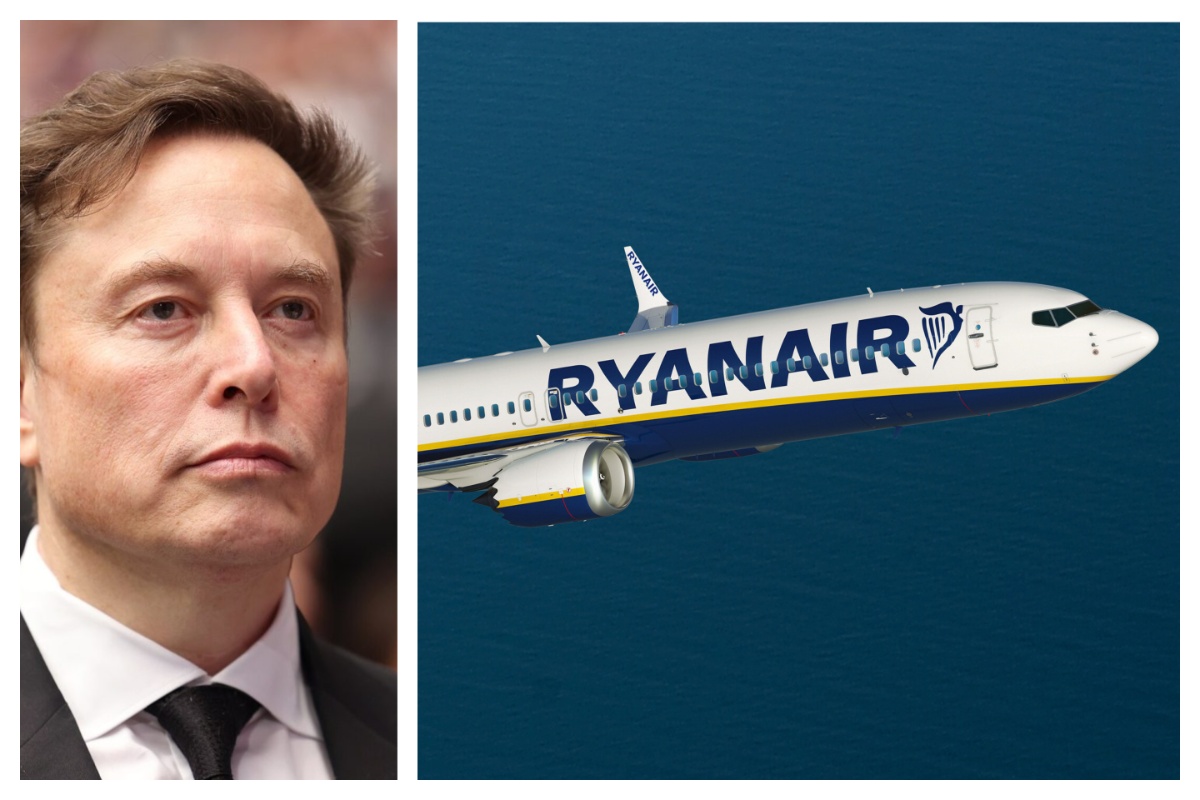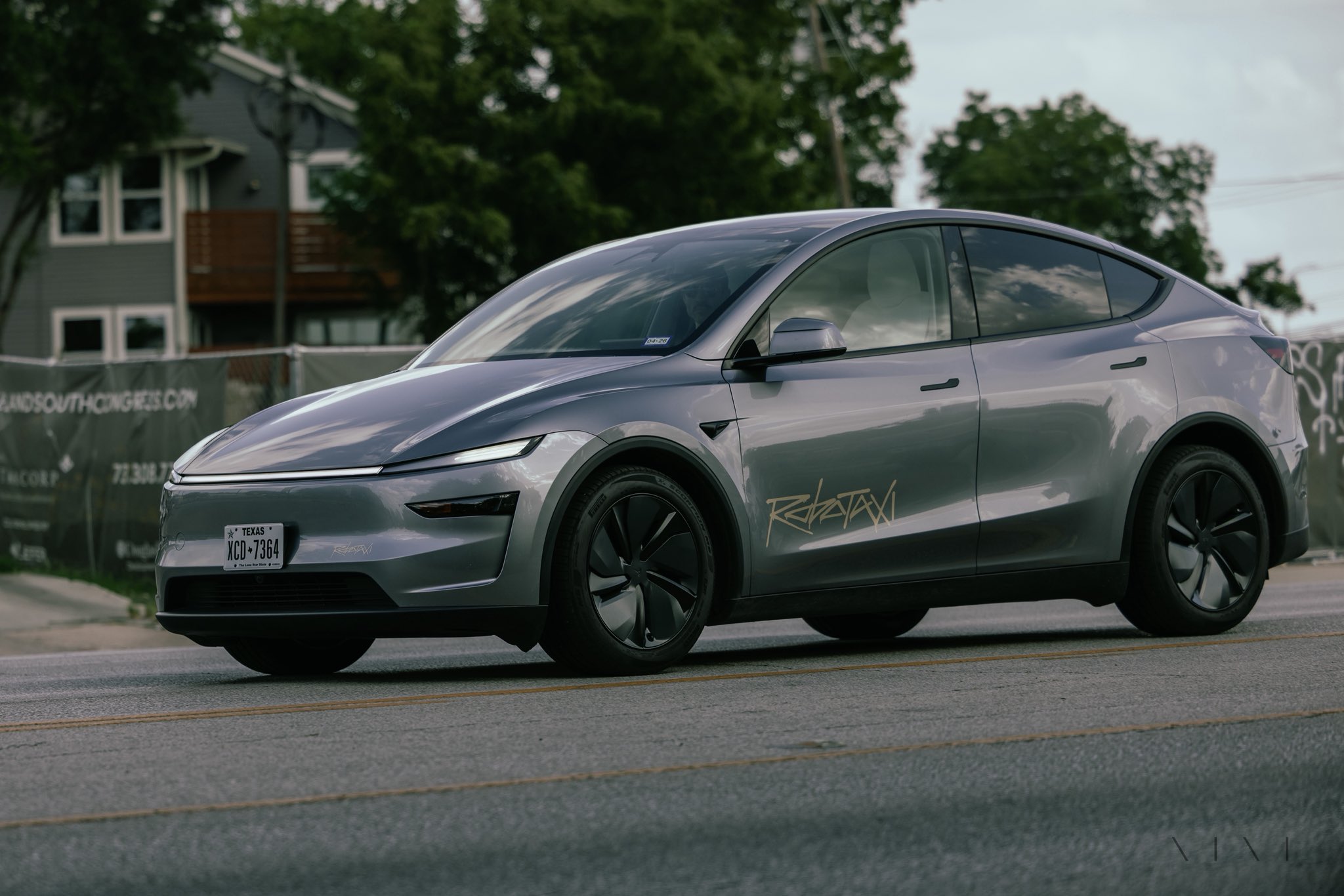

News
Tesla Model 3 Highland risks stop-delivery notice or recall over compliance rule in Australia
The Tesla Model 3 Highland might be at risk of a stop-delivery notice or recall over a compliance rule in Australia.
Federal regulators in Australia are investigating the refresh Tesla Model 3 for breaching a motor-vehicle rule under the Australian Design Rules (ADR). The breach regards a top-tether anchor point used to secure car seats for children.
Under the ADR, five-seat passenger cars with three seatbelts in the back seats are required to have an accessible top-tether point in the middle rear seat. The Tesla Model 3 Highland does not have an accessible top-tether point that follows the ADR’s description.
Tesla’s 2023 refresh Model 3 has a top-tether point under the trim panel behind the rear-seat headrests. The Model 3 highland risks a breach in ADR guidance since the compliance rules state that the top-tether point must be accessible “without the use of tools.”
“The Department of Infrastructure, Transport, Regional Development, Communications, and the Arts is aware of concerns regarding the child restraint anchorage points in the 2024 Tesla Model 3 and is looking into this matter.
“Road safety is a top priority of the Australian Government. That is why we have legislated road vehicle standards in place to ensure all road vehicles, both new and used, being provided to the Australian market for the first time meet critical national standards for safety, security, and emissions,” a spokesperson from Australia’s Department of Infrastructure, Transport, Regional Development, Communication and The Arts told Drive.
The 2024 Tesla Model 3’s safety rating has been withheld as federal regulators investigate the compliance breach. The previous Model 3 held a five-star rating. The 2024 model will be marked “unrated” for the time being.
If you have any tips, contact me at maria@teslarati.com or via X @Writer_01001101.

Elon Musk
Tesla CEO Elon Musk trolls budget airline after it refuses Starlink on its planes
“I really want to put a Ryan in charge of Ryan Air. It is your destiny,” Musk said.

Tesla CEO Elon Musk trolled budget airline Ryanair on his social media platform X this week following the company’s refusal to adopt Starlink internet on its planes.
Earlier this week, it was reported that Ryanair did not plan to install Starlink internet services on its planes due to its budgetary nature and short flight spans, which are commonly only an hour or so in total duration.
Initially, Musk said installing Starlink on the company’s planes would not impact cost or aerodynamics, but Ryanair responded on its X account, which is comical in nature, by stating that a propaganda it would not fall for was “Wi-Fi on planes.”
Musk responded by asking, “How much would it cost to buy you?” Then followed up with the idea of buying the company and replacing the CEO with someone named Ryan:
I really want to put a Ryan in charge of Ryan Air. It is your destiny.
— Elon Musk (@elonmusk) January 19, 2026
Polymarket now states that there is an 8 percent chance that Musk will purchase Ryanair, which would cost Musk roughly $36 billion, based on recent financial data of the public company.
Although the banter has certainly crossed a line, it does not seem as if there is any true reason to believe Musk would purchase the airline. More than anything, it seems like an exercise of who will go further.
Starlink passes 9 million active customers just weeks after hitting 8 million
However, it is worth noting that if something is important enough, Musk will get involved. He bought Twitter a few years ago and then turned it into X, but that issue was much larger than simple banter with a company that does not want to utilize one of the CEO’s products.
The insufferable, special needs chimp currently running Ryan Air is an accountant. Has no idea how airplanes even fly.
— Elon Musk (@elonmusk) January 20, 2026
In a poll posted yesterday by Musk, asking whether he should buy Ryanair and “restore Ryan as their rightful ruler.” 76.5 percent of respondents said he should, but others believe that the whole idea is just playful dialogue for now.
But it is not ideal to count Musk out, especially if things continue to move in the direction they have been.
News
Tesla Robotaxi’s biggest rival sends latest statement with big expansion
The new expanded geofence now covers a broader region of Austin and its metropolitan areas, extended south to Manchaca and north beyond US-183.

Tesla Robotaxi’s biggest rival sent its latest statement earlier this month by making a big expansion to its geofence, pushing the limits up by over 50 percent and nearing Tesla’s size.
Waymo announced earlier this month that it was expanding its geofence in Austin by slightly over 50 percent, now servicing an area of 140 square miles, over the previous 90 square miles that it has been operating in since July 2025.
Tesla CEO Elon Musk shades Waymo: ‘Never really had a chance’
The new expanded geofence now covers a broader region of Austin and its metropolitan areas, extended south to Manchaca and north beyond US-183.
These rides are fully driverless, which sets them apart from Tesla slightly. Tesla operates its Robotaxi program in Austin with a Safety Monitor in the passenger’s seat on local roads and in the driver’s seat for highway routes.
It has also tested fully driverless Robotaxi services internally in recent weeks, hoping to remove Safety Monitors in the near future, after hoping to do so by the end of 2025.
Tesla Robotaxi service area vs. Waymo’s new expansion in Austin, TX. pic.twitter.com/7cnaeiduKY
— Nic Cruz Patane (@niccruzpatane) January 13, 2026
Although Waymo’s geofence has expanded considerably, it still falls short of Tesla’s by roughly 31 square miles, as the company’s expansion back in late 2025 put it up to roughly 171 square miles.
There are several differences between the two operations apart from the size of the geofence and the fact that Waymo is able to operate autonomously.
Waymo emphasizes mature, fully autonomous operations in a denser but smaller area, while Tesla focuses on more extensive coverage and fleet scaling potential, especially with the potential release of Cybercab and a recently reached milestone of 200 Robotaxis in its fleet across Austin and the Bay Area.
However, the two companies are striving to achieve the same goal, which is expanding the availability of driverless ride-sharing options across the United States, starting with large cities like Austin and the San Francisco Bay Area. Waymo also operates in other cities, like Las Vegas, Los Angeles, Orlando, Phoenix, and Atlanta, among others.
Tesla is working to expand to more cities as well, and is hoping to launch in Miami, Houston, Phoenix, Las Vegas, and Dallas.
Elon Musk
Tesla automotive will be forgotten, but not in a bad way: investor
It’s no secret that Tesla’s automotive division has been its shining star for some time. For years, analysts and investors have focused on the next big project or vehicle release, quarterly delivery frames, and progress in self-driving cars. These have been the big categories of focus, but that will all change soon.

Entrepreneur and Angel investor Jason Calacanis believes that Tesla will one day be only a shade of how it is recognized now, as its automotive side will essentially be forgotten, but not in a bad way.
It’s no secret that Tesla’s automotive division has been its shining star for some time. For years, analysts and investors have focused on the next big project or vehicle release, quarterly delivery frames, and progress in self-driving cars. These have been the big categories of focus, but that will all change soon.
I subscribed to Tesla Full Self-Driving after four free months: here’s why
Eventually, and even now, the focus has been on real-world AI and Robotics, both through the Full Self-Driving and autonomy projects that Tesla has been working on, as well as the Optimus program, which is what Calacanis believes will be the big disruptor of the company’s automotive division.
On the All-In podcast, Calcanis revealed he had visited Tesla’s Optimus lab earlier this month, where he was able to review the Optimus Gen 3 prototype and watch teams of engineers chip away at developing what CEO Elon Musk has said will be the big product that will drive the company even further into the next few decades.
Calacanis said:
“Nobody will remember that Tesla ever made a car. They will only remember the Optimus.”
He added that Musk “is going to make a billion of those.”
Musk has stated this point himself, too. He at one point said that he predicted that “Optimus will be the biggest product of all-time by far. Nothing will even be close. I think it’ll be 10 times bigger than the next biggest product ever made.”
He has also indicated that he believes 80 percent of Tesla’s value will be Optimus.
Optimus aims to totally revolutionize the way people live, and Musk has said that working will be optional due to its presence. Tesla’s hopes for Optimus truly show a crystal clear image of the future and what could be possible with humanoid robots and AI.








